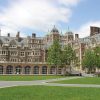United Kingdom: Immigrants raising education standards

Immigrant children: ‘London effect’
England’s teenagers are in limbo. They have sat their GSCE exams, which most take at 16, and will receive the results on August 21. If they are nervous, they should be. Good GSCE grades open doors to colleges and universities, whereas bad grades shut them. But teenagers in big cities should worry less. They are likely to do better than their peers elsewhere, and better than their predecessors.
Over the past two decades the change in Manchester is plain. Pupils entitled to free school meals (which, because Manchester is poor, is almost half of them) now outperform their peers in England as a whole. Poor pupils in Birmingham and London are even further ahead. In Leeds, results have gone from appalling to average.
The success of poor pupils in London is well known. It was already evident two decades ago; later it was dubbed the “London effect”. Together with a booming economy, the capital’s growing educational success helped turn it into a thriving and confident global city, the envy of the rest of Britain. Several other big cities are now faring better in part because they have come to resemble London.
London has long been more ethnically mixed and more foreign-born than the country as a whole. That helps because almost every group does better at school than poor white Britons. Simon Burgess, an economist at the University of Bristol, showed in 2014 that the success of secondary-school pupils in London could be explained by the fact that so many were from ethnic-minority groups. Migrants’ children and grandchildren have the good fortune (which may not always feel like good fortune) of being nagged by parents who were driven by ambition to uproot themselves.
Big cities may have got better at teaching, too. Since the late 2000s schools in Greater Manchester have been encouraged to learn from each other. Mel Ainscow, an educationist who drove that process, says that headteachers took to it more readily than their counterparts in some towns and rural areas. In a small place where everyone knows everyone, criticism can feel personal.
The fact that cities tend to have growing populations, and need new schools, can be another advantage. New schools are often fired by a sense of mission. Star Academies, a particularly successful group of schools, has opened 21 “free” schools across England — free from local-authority control, that is. Sir Hamid Patel, its chief executive, says it has been easier to find sites in cities like Birmingham and Manchester than in smaller towns, where local politicians may worry about drawing pupils away from existing schools.
Pupils in big cities are also close to diverse job markets, universities and cultural institutions. In Birmingham, Star Academies has formed a partnership with Mercedes-amg petronas, a motorsport outfit. Their schools can hire young, keen teachers. Perhaps the wonder is not that urban teens fare well, but that it was ever otherwise.
















Add comment